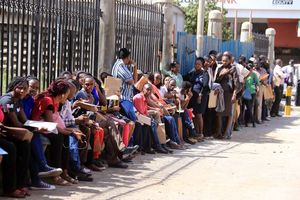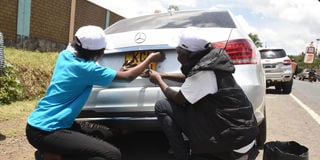
Sharon Kipkurgat (left) and Shannel Kibet fix a number plate on a vehicle outside the NTSA offices in Nakuru on March 11, 2024.
With the job market flooded with graduates, dwindling white-collar opportunities have forced many to turn to unconventional employment.
This reality became starkly apparent when Nation.Africa visited the National Transport and Safety Authority (NTSA) offices in Nakuru.
Here, more than 15 young people actively bid for clients to get their new reflective generation registration plates.
Under the scorching sun or rainy afternoons, competition is fierce and survival is for the fittest, with the fastest securing their livelihood.
The lack of a structured approach to acquiring clients means that, upon spotting a vehicle approaching or leaving the NTSA offices, the workers rush to vie for the opportunity to secure a job, be it lorries, personal cars, tuk tuks, or motorbikes.
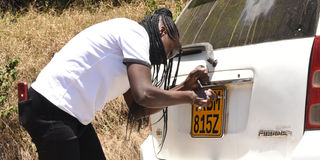
Shannel Kibet fixes a number plate on a vehicle outside the NTSA offices in Nakuru on March 11, 2024.
What distinguishes this scene is the notable presence of three young women armed with plate holders used for binding reflective number plates.
They compete with their male counterparts for clients leaving the authority’s offices.
Among them is Sharon Kipkurgat, 23, a Laikipia University graduate.
Her journey into the world of binding and fixing vehicle number plates began shortly after her graduation in 2022.
"I was at home, unemployed, when a cousin of mine called with a job opportunity in Nakuru. Without hesitation, I decided to give it a try. I underwent a weeklong training on using the pop rivet gun, trimming number plates, binding plate holders, and installing the new digital number plates," Ms Kipkurgat explains.
However, she points out that this line of work is not for the faint-hearted.
“I would say it's survival of the fittest. Once you spot a car you all run towards it to try and make your bid for work. Kazi ni kazi,” she says, adding the number plate business has now become her primary source of income.
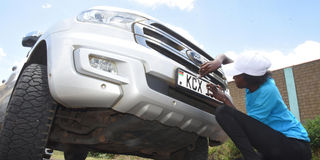
Sharon Kipkurgat fixes a number plate on a vehicle outside the NTSA offices in Nakuru on March 11, 2024.
Her story is similar to that of Shannel Kibet, who pioneered this unconventional job opportunity.
At 21 in 2022, she identified an opening created by the government's introduction of digital number plates to combat crime and fraud.
Working as a saleswoman at an automobile accessory shop in Nakuru, she discerned an opportunity to offer a service that alleviated the inconvenience faced by motorists queuing for new number plates.
"After hearing our clients complain about long queues at the garage for new number plates, I visited the NTSA offices to see if anyone was providing the service. To my surprise, no one was, and that's when I decided to start. On a good day, I serve up to 10 clients,” says Ms Kibet.
With some knowledge of number plate replacement, Ms Kibet, a professional plant operator from the Kenya Institute of Highway and Technology in Kisii, set up shop outside the NTSA office.
Her first day marked the beginning of a successful venture, serving four clients and charging each Sh2,000. She quit her sales job and embraced her new venture.
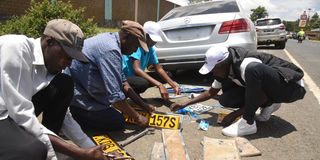
Sharon Kipkurgat (third left) and Shannel Kibet (right) with their colleagues fix number plates to plain metal sheets before mounting them on vehicles outside NTSA offices in Nakuru. on March 11, 2024.
A year later, her business flourished to the extent that she hired employees, with a total of 10 individuals currently working under her. She also took on the role of training over 15 people in this unconventional, but thriving occupation.
Ms Kibet explains that they start work at 7:20am and close by 4:30pm when the NTSA offices close. However, depending on demand they sometimes extend their work hours up to 6pm.
The process of removing old plates, binding new ones, and installing them takes a maximum of 10 minutes per job.
They charge clients Sh300 for using the old plate holder, while new plate holders are available for purchase at prices ranging from Sh800 to Sh2,000, with free installation.
While the number plate business has provided economic empowerment to these women, it's not without its set of challenges. Ms Kibet said they are often harassed by police officers and county government officials.
They are exposed to potential arrests on charges of obstruction and possible accidents since they work on the roadside. Additionally, adverse weather conditions impact their work.
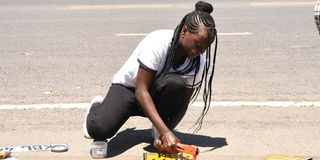
Shannel Kibet prepares to fix a number plate on a vehicle outside the NTSA offices in Nakuru on March 11, 2024.
Lack of shelter means they must pause during rainy weather, and if they're attending to a vehicle when it starts raining, they might need to complete the job despite the weather.
Despite these obstacles, Ms Kibet views this venture as a lifetime bet that paid off. The Sh10,000 capital she invested in acquiring tools has been appreciated and will support her in her next business endeavor.
Virginia Kamau, who joined the business after being trained by Ms Kibet, cites the motivation of spending more time with her child as her driving force.
"I quit my job for the sake of my child. The long hours at work affected our bond since I hardly had time to be at home. With the number plate job, I get free weekends as NTSA offices are closed, and the pay is also enough to sustain my family," says the 26-year-old.
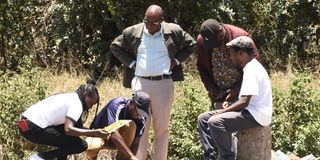
Shannel Kibet (left) with a colleague prepare to fix number plates on a vehicle outside the NTSA offices in Nakuru on March 11, 2024.
She also says despite the lucrative nature of the business, she understands that it may be temporary.
“The installation of new digital number plates may soon come to an end when the government announces deadlines for the replacement. We have been making savings together and we will be looking into opening our garage or investing the money in an automobile shop where we can put to use the skills we have honed from this job,” she says.


